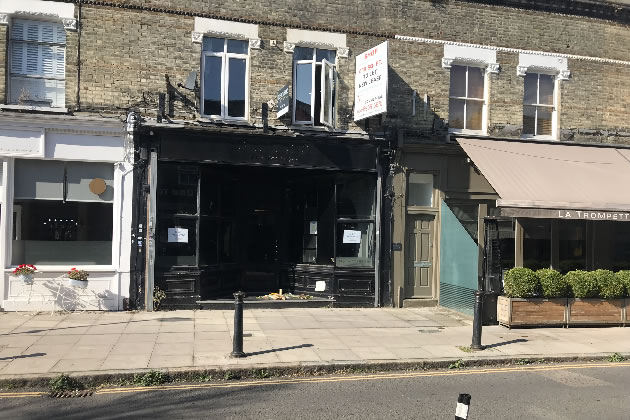New Figures Show Six Deaths in London Linked to Synthetic Opiods
Police not confirming any link with Chiswick fatalities

Flowers and a candle let in the doorway where one of the women died
April 7, 2024
New figures released by the National Crime Agency (NCA) have confirmed that new super-strength drugs have caused six deaths in London over the last six months.
Between June 2023 and February 2024 post mortem toxicology reports confirmed that the deaths were linked to the presence of nitazene, a powerful synthetic opioid stronger than fentanyl.
When two women died in Chiswick last autumn, we asked the NCA if it was thought that the deaths could be linked to fentanyl being present in heroin being sold locally. They told us that this was unlikely as there was little evidence of fentanyl in drugs being sold in London but that they were increasingly concerned about nitazene which had been established as being present in other parts of the country.
These latest figures show that it has been linked to the deaths of 101 people across the UK over 9 months with Scotland and the West Midlands seeing the most cases.
The police have not confirmed that nitazene was a contributory factor in the deaths of 44-year-old Rachel Wright on Devonshire Road on 11 September 2023 and Petina Philips on Magnolia Road on 16 October 2023 but both women were habitual drug users who are thought to have been unlikely to have accidentally overdosed.
A post mortem was held for Ms Wright on 14 September 2023 with the cause of death being undetermined and further toxicology reports were requested but the results of these have not been published. Ms Philips death was described as ‘unexpected’ but no further information has been released by the authorities. The officers investigating were unwilling to confirm or deny that her death was caused by a more potent batch of heroin was a line of enquiry.
Local reports say that the two women may have bought drugs from the same supplier who had recently become more active in the Chiswick area.
The increased prevalence of nitazene in heroin being sold on the streets is being attributed to a reduction in supply from poppy fields in Afghanistan due to a crackdown by the Taliban.

A Taliban crackdown on poppy fields is reducing global supply of heroin
The NCA believes nitazenes are produced in illicit labs in China and are entering the UK through the Royal Mail and other parcel operators. In most cases, they are then cut and mixed with heroin by organised gangs, strengthening the drugs they sell.
The NCA says at this stage there is not a heroin shortage in the UK as there remain significant reserves. A spokesman said the purity of street-level heroin had declined in the last year as part of a long-term trend.
The agency has worked with police across the UK and internationally to target key offenders including those selling on dark net markets.
Nitazenes were first developed in the 1950s as a pain-killing medication but are so potent and addictive they have never been approved for medical or therapeutic use Injected, inhaled or swallowed, mixing them with other drugs and alcohol is extremely dangerous and significantly increases the risk of overdose and death.
Indications that someone has ingested nitazene include small, narrowed pupils, reduced or loss of consciousness, cold or clammy skin and blue or grey lips and fingernails.
They have also been found in samples of illegal diazepam tablets, most likely bought online. Diazepam - also known by one of its brand names, Valium - is a class-C drug in the UK, commonly used to treat anxiety, muscle spasms and seizures. It is illegal to possess without a prescription. Most of the 58 samples submitted voluntarily to Public Health Wales's drug testing service, Wedinos, which were found to contain nitazenes between June last year and February, were from people who had intended to buy Benzodiazepines such as Diazepam.
Currently, there is no national system to track fatalities and non-fatal overdoses from synthetic opioids, so many professionals working with drug users believe the problem is being significantly understated and the government admits there are ‘information gaps’ in its knowledge of the spread of the problem. Figures are gathered by the government from local services and are based on tests of seized drugs and paraphernalia or samples from drug users.
Those records, obtained by the BBC through a Freedom of Information request, suggest there were four non-fatal nitazene overdoses across the West Midlands in the last six months of 2023.
But Dr Mark Pucci, a consultant in clinical toxicology who works in Birmingham and Sandwell says he observed 13 patients who overdosed and survived between July and October 2023.
They were among 19 people who tested positive for the drug in blood or urine tests. None of the patients knew beforehand they had taken nitazene.
He said, "I believe there are very few NHS labs around the country that are set up to test for nitazenes.
"I do believe England is behind the curve on this matter and is now playing catch up. The data collection method they are using in terms of testing drug paraphernalia and so on is only ever going to be the tip of the iceberg."
A BBC Shared Data Unit investigation has also found that on top of the 101 deaths linked to nitazene already recorded at least a further 49 cases await further testing.
The Department of Health and Social Care DHSC is consulting on a legal change so more professionals can give out take-home supplies of naloxone - a medicine that can reverse the effects of an opioid overdose.
The DHSC said it had a surveillance system in place to collect information on the nature and location of novel drug use. Work was under way to improve these systems including collating information from ambulance call-outs and hospital admissions.
Written with contributions from the BBC Shared Data Unit
Value Reading Articles Like This? Help Us Produce More This site remains committed to providing local community news and public interest journalism. Articles such as the one above are integral to what we do. We aim to feature as much as possible on local societies, charities based in the area, fundraising efforts by residents, community-based initiatives and even helping people find missing pets. We've always done that and won't be changing, in fact we'd like to do more. However, the readership that these stories generates is often below that needed to cover the cost of producing them. Our financial resources are limited and the local media environment is intensely competitive so there is a constraint on what we can do. We are therefore asking our readers to consider offering financial support to these efforts. Any money given will help support community and public interest news and the expansion of our coverage in this area. A suggested monthly payment is £8 but we would be grateful for any amount for instance if you think this site offers the equivalent value of a subscription to a daily printed newspaper you may wish to consider £20 per month. If neither of these amounts is suitable for you then contact info@neighbournet.com and we can set up an alternative. All payments are made through a secure web site. One-off donations are also appreciated. Choose The Amount You Wish To Contribute. If you do support us in this way we'd be interested to hear what kind of articles you would like to see more of on the site – send your suggestions to the editor. For businesses we offer the chance to be a corporate sponsor of community content on the site. For £30 plus VAT per month you will be the designated sponsor of at least one article a month with your logo appearing if supplied. If there is a specific community group or initiative you'd like to support we can make sure your sponsorship is featured on related content for a one off payment of £50 plus VAT. All payments are made through a secure web site. |